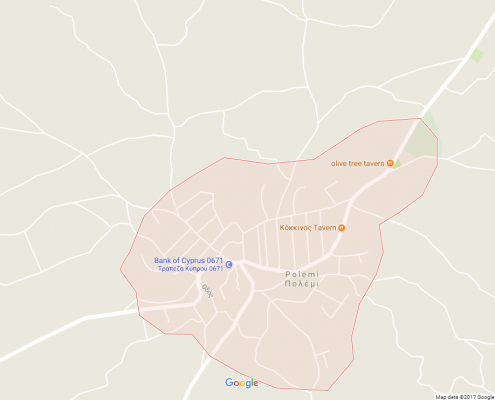Polemi is a pioneer in the sector of education. Education in Polemi goes back to the first half of the 19th century and is inextricably connected with the glebe of Kykkos Monastery activities. The establishment of the Polemi Trade School is the epitome of high standard education in Polemi. Let us have a closer look at the history of education in Polemi that contributed to the development of spiritual life in the area.
Kykkos Monastery took on the education of a bursar, a monk named Savvas Kykkotis in Thessaloniki and at the Great School. He was later on the teacher of the village. Since 1833, the teacher of the village, known as “the great scholar” (loyiotatos), taught “ecclesiastical letters”, such as writing, arithmetic and ecclesiastical music at his house. From 1863, when he died, until 1878 priests took on the education of the inhabitants. In 1878 a new teacher came to the village. His name was Hadjisthenis Stavrinides and he studied in Jerusalem. In the meantime, in 1870, the community school was established.
At the beginning of the 20th century, in 1948, with the initiative of some inhabitants, the district Gymnasium (High School) was established. This building served as the Community Trade School or Higher Trade School of Polemi earlier.
The establishment of this school after the II World War was an achievement for that time, considering the difficulties. Cyprus was under English domination at the time, which was really considered as far as education was concerned. The establishment of the school was a vision of teacher Nicos Karapatakis and a team of progressive inhabitants. The initially turned to the Eparch of Paphos, then to Anthimos but they did not obtain a positive response. After that they convinced the officials of the village to talk to the people responsible for educational matters. A deal was closed, namely the village obtained the license for the establishment of the school. For exchange the school had to be controlled by the tax office of the government.
The community of Polemi gathered on the 10th July 1949 o talk about the establishment of the Higher School and also the constitution of its “constitution”. After long discussions, the constitution was approved and its regulations consisting of thirty articles were established.
Philippos Constantinou mentions that the 1st and 2nd article established the “name and place of the School”. The 3rd one established the aim of the School, which was the education of the children in the countryside independent of race and religion.
What is more, through the articles a lot of issues regarding school administration and organization were settled. For instance, Nicos Karapatakis was assigned principle and founder of the school. He was also “in charge for the constitution of the work programs, the supervision of teachers and the discipline of students”. The school administration was taken on by a “School Committee” consisting of ten members, with five-year tenures. The committee was elected by all male inhabitants older than 22 years old.
The General Assembly then elected a Committee of eleven members. One of them was the priest of the village, Panayiotis Neophytou. The committee had an advisory role.
What is considered extremely important is the decision of the School Committee to enroll in the “record of secondary education schools” in 1952, as a “publicly subsidized” school with the provision to follow a “program of trade orientation”. This meant that the teachers were paid by the government but also that the government controlled all apperceptions, time schedules and analytical programs.
The afore-mentioned decision of the school was widely criticized, because it coincided with the preparation of the liberation fight against English domination. In a magazine named “National Cyprus”, the inhabitants of Polemi were reproached as English “confederates”. This accusation was of course refuted by the young people of Polemi who fought against the English during the liberation fight from 1955 until 1959.
What is more, it must be noted that the decision was taken when the School was facing economical problems. That is why Philippos Constantinou mentions that: “I believe that the school administration and inspectorate were wrongly accused for their decision, which was wise and noble at the time and under the certain circumstances”.
Three years after the enrolment of the school in the “record of secondary education schools”, namely in August 1955, a modern school building and labs were constructed. The expenses reached twenty six thousand eight hundred pounds, seven thousand five hundred of which were sponsored by the government. In 1960, when Cyprus was declared a Republic, the loan was taken on by the president and archbishop Makarios III.
In the meantime, in 1958, the school was renamed as Trade Lyceum of Polemi and in 1959 as Trade Gymnasium and was simultaneously controlled by the “Greek Educational Board, like all other Greek schools”.
The establishment of the Gymnasium was important for Polemi and the neighboring villages, as it offered the chance of education to all children independent of sex and financial status. Initially, only boys went to this school but this changed in the 1950’s due to the president of the school inspectorate.
Nowadays, there is a plate in the school yard on which the names of the members of the First School Inspectorate of Polemi are inscribed. The first members were:
- Father Georgios Neophytou
- Charalambos Philippides
- Panayiotis Lambrou
- Ioannis Theodossiou
- Charalambos D. Parperis
- Michalakis Christodoulou
- Christodoulos Georgiou
- Costas Theodossiou
- Iakovos I. Soteriades
- Panayiotis Kokkinos
- Charilaos Georgiou
- Theodossios Antoniou
- Charilaos S. Komodrakos
Undoubtedly, Polemi was the bastion of knowledge for the district of Paphos. The graduates of the Polemi School managed to make their mark in whatever they took on. Many of them managed to work for the government and achieved high positions.
Sources:
Inhabitants of the village
Constantinou Philippos, “The genesis of the Polemi-Paphs Gymnasium”, newspaper “Aletheia”, 15th January 2006
Spiritual Pharos, Magazine of Polemi Gymnasium 2004-2005








Elementary School
Kindergarten
High school
Lykeum



